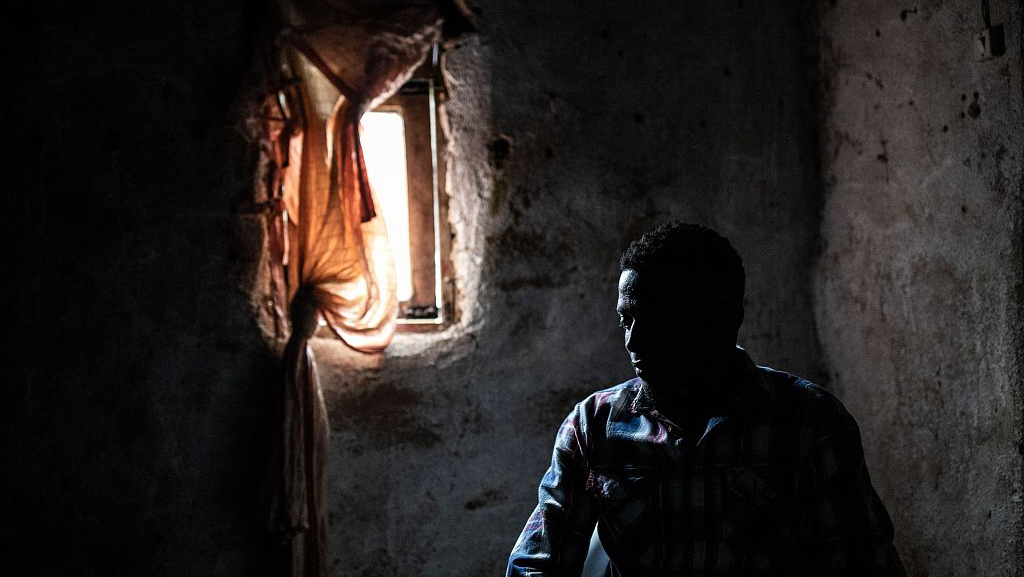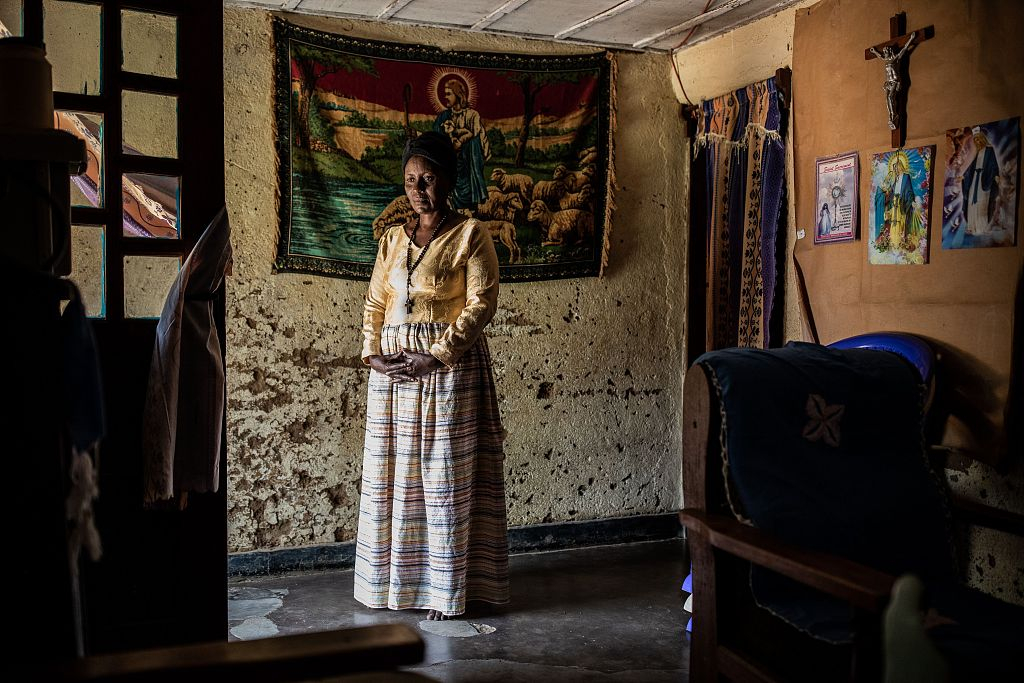
Claude Mabowa, 21, an Ebola virus survivor, sits inside what used to be his sister's bedroom in Beni, the Democratic Republic of Congo, September 17, 2019. /VCG Photo
Claude Mabowa, 21, an Ebola virus survivor, sits inside what used to be his sister's bedroom in Beni, the Democratic Republic of Congo, September 17, 2019. /VCG Photo
Editor's note: Gro Harlem Brundtland is former prime minister of Norway, former director-general of the World Health Organization, and co-chair of the Global Preparedness Monitoring Board. Elhadj As Sy is secretary general of the International Federation of Red Cross and Red Crescent Societies and co-chair of the Global Preparedness Monitoring Board. The article reflects the authors' opinions and not necessarily the views of CGTN.
Imagine the following scenario. In a matter of days, a lethal influenza pandemic spreads around the world, halting trade and travel, triggering social chaos, gutting the global economy, and endangering tens of millions of lives. Such a large-scale disease outbreak is an alarming – but entirely realistic – prospect. To mitigate the risks, the world must take steps now to prepare.
Over the last several years, a litany of outbreaks – from yellow fever to Ebola – have occurred, including in densely populated areas. Now, a new report by the Global Preparedness Monitoring Board warns that humankind is stumbling toward the twenty-first-century equivalent of the 1918 influenza pandemic, which affected one-third of the world's population and killed approximately 50 million people.
A similar outbreak today would spread much faster and more widely and could severely affect economies globally – potentially resulting in a loss of 5 percent of the global economy. And yet, despite the threat that this and other health emergencies pose to global security, preparing for them is rarely a priority for political leaders. As of today, no government has fully funded or implemented the International Health Regulations, the principal international treaty for health security, to which all countries have committed. It is thus not surprising that the world is woefully unprepared for a rapidly moving airborne pandemic.
To be sure, we have already developed many of the tools we need to prevent, treat, and contain diseases, including vaccines, diagnostics, and drugs. But world leaders are not doing enough to scale them up. And if a pandemic erupts, it will be too late to avoid serious damage to communities. That is why investment is urgently needed to deliver life-saving health technologies to the communities that are most in need.
But outbreak preparedness is as much a social, political, and security issue as it is a medical one, with factors like diminished trust in institutions and the deliberate spread of misinformation impeding effective action. This can be seen in the current Ebola outbreak in the Democratic Republic of Congo.

Leonie Masika, 52, an Ebola survivor, inside her living room in Beni, the Democratic Republic of Congo, September 17, 2019. /VCG Photo
Leonie Masika, 52, an Ebola survivor, inside her living room in Beni, the Democratic Republic of Congo, September 17, 2019. /VCG Photo
In many ways, the World Health Organization and its partners have significantly improved their response capabilities since the 2014-2016 Ebola outbreak in West Africa, including by employing breakthrough vaccines, medicines, and innovative technologies. But the current outbreak in the Democratic Republic of Congo is unfolding in a far more complex environment, characterized by politicization and lack of trust in authorities and health workers, and it is affecting communities suffering from severe and longstanding insecurity. In such a context, top-down solutions are not enough.
Outbreaks begin and end in communities, yet national and international authorities rarely take the time or make the necessary investments to involve them. A better approach would recognize each community's needs and ensure that local people are fully engaged in planning and accountability mechanisms.
Of course, protecting against disease outbreaks will cost money. But not as much as one might think: according to data from the World Bank, most countries would need to spend just one to two U.S. dollars per person per year to reach an acceptable level of health emergency preparedness. That amounts to a return on investment of ten to one, or even higher.
And the return on investment does not consider the benefits beyond health for the economy or social stability. In today's deeply interconnected world, if one community cannot prevent or manage disease outbreaks, everyone is at risk. Given this, all parts of society, including the security sector, must be involved in prevention and planning, and wealthier countries need to invest more in helping lower-income countries to reach adequate levels of preparedness.
This includes not only targeted initiatives, but also more broad-based investments that improve the quality, reach, and sustainability of public health systems and the full engagement of communities. The world should be doing this anyway: United Nations Sustainable Development Goal three aims to deliver "universal health coverage, including financial risk protection, access to quality essential health-care services, and access to safe, effective, quality, and affordable essential medicines and vaccines for all" by 2030.
For too long, health emergencies have been met with a cycle of panic and neglect – an approach that is highly inefficient and expensive – and that is putting all of us at growing risk. Governments worldwide must start thinking ahead and increase funding at the community, national, and international levels to shore up health systems, improve our capacity to respond to health emergencies, and prevent the spread of outbreaks, whether of known pathogens like Ebola or unknown ones, say, that spread from animals to humans.
We have the knowledge and tools. There is no excuse for being caught unprepared.
Copyright: Project Syndicate, 2019.
(If you want to contribute and have specific expertise, please contact us at opinions@cgtn.com.)